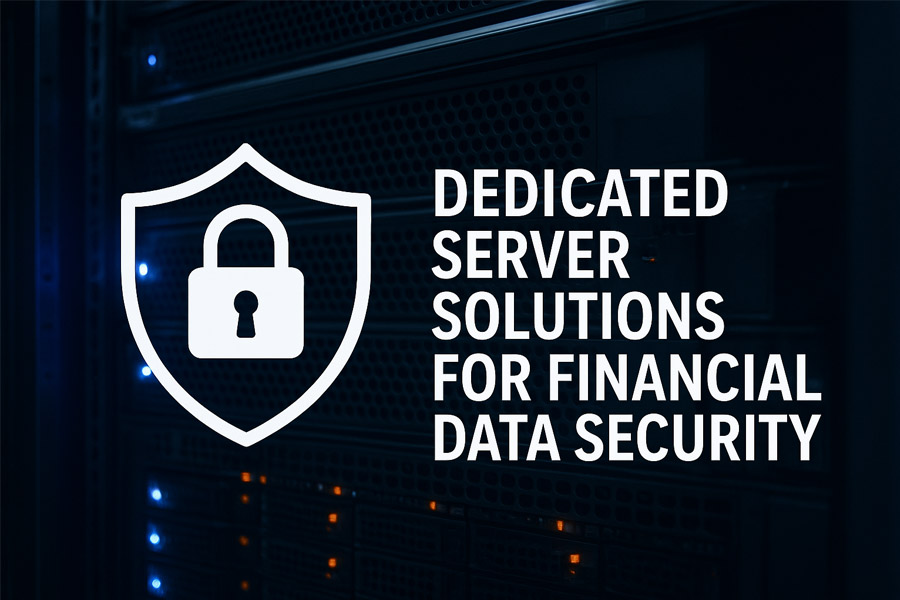Financial data is one of the most sensitive and valuable assets a business holds. From client account details to investment portfolios, any breach can lead to devastating consequences. Hackers target financial institutions because the payoff can be huge, and the damage to reputation is often irreparable.
This is where hosting solutions, especially dedicated servers, come into play, acting as the backbone of a secure digital infrastructure.
Understanding Dedicated Server
What is Dedicated Server Hosting?
A dedicated server is a physical server exclusively used by a single client. Unlike shared hosting, where multiple websites share the same server resources, a dedicated server offers full control, enhanced performance, and improved security.
Key Features of Dedicated Server Hosting
- Exclusive resources (CPU, RAM, storage)
- Full administrative control
- Enhanced customization options
- Higher reliability and uptime
Difference Between Dedicated, VPS, and Shared Hosting
- Shared hosting: Cheapest but least secure
- VPS hosting: Mid-tier security with virtual partitions
- Dedicated server: Maximum control and isolation
Why Financial Firms Prefer Dedicated Servers
1. Data Isolation and Control
With dedicated servers, financial firms are not sharing space with other clients, eliminating cross-contamination risks.
2. Enhanced Performance for Financial Applications
Trading platforms, accounting software, and data analytics tools require high-speed processing, something dedicated server hosting provides effortlessly.
3. Compliance with Industry Regulations
Dedicated servers facilitate the implementation and maintenance of compliance with regulations such as PCI DSS and GDPR.
Dedicated Servers Hosting vs. Cloud Hosting for Accounting Firms
Pros and Cons of Dedicated Servers for Accountants
- Pros: Full control, higher security, predictable performance
- Cons: Higher cost, requires technical expertise
When Cloud Hosting is a Better Fit
For small accounting firms without in-house IT teams, cloud hosting can offer scalability and ease of management.
Hybrid Hosting for Financial Businesses
Many firms adopt a hybrid approach, using servers for sensitive data and cloud hosting for less critical applications.
Key Security Features of a Dedicated Server
1. Encryption Protocols
All data transfers should use end-to-end encryption to prevent interception.
2.DDoS Protection
Dedicated servers often come with advanced DDoS mitigation tools to keep systems running during an attack.
3. Firewall and Intrusion Detection Systems
Layered security ensures hackers face multiple barriers before accessing sensitive data.
4. Regular Security Audits
Frequent security checks identify vulnerabilities before they become threats.
Choosing Between Cheap Dedicated Servers Hosting and Premium Solutions
1. Risks of Going Too Cheap
Low-cost providers may cut corners on security, making you vulnerable.
2. Balancing Budget and Security
Choose a provider that offers essential security features even in cheap dedicated server hosting plans.
Must-Have Features in Affordable Plans
- DDoS protection
- SSL certificates
- 24/7 monitoring
How Dedicated Servers Support Financial Compliance
1. PCI DSS Compliance
Essential for firms handling payment card data.
2. GDPR and Other Privacy Laws
Dedicated hosting allows better control over where and how data is stored.
3. Secure Backups and Disaster Recovery
Automated backups ensure quick recovery after a system failure or attack.
Real-World Use Cases
1. Hosting Accounting Software Like QuickBooks or Sage
Dedicated servers ensure faster load times and better security for financial tools.
2. Secure Data Storage for Banks
Banks rely on isolated environments to store client transaction data.
3. Investment Firms and Trading Platforms
Low-latency servers are critical for real-time trading operations.
Factors to Consider Before Choosing a Dedicated Server
1. Server Location
Select a data center location that aligns with your country’s data privacy and security regulations.
2. Bandwidth and Storage Needs
Financial applications demand high bandwidth and ample storage to ensure smooth, uninterrupted performance.
3. Managed vs. Unmanaged Options
Managed services handle updates, security, and maintenance for you, while unmanaged servers give you full control and customization.
Steps to Secure Your Dedicated Servers
1. Strong Password Policies
Require complex, unique passwords and enable multi-factor authentication (MFA) to add an extra layer of security.
2. Regular Updates and Patches
Outdated software is a goldmine for hackers. Regularly update operating systems, applications, and security tools to close vulnerabilities.
3. Monitoring and Threat Detection
Use 24/7 monitoring solutions and intrusion detection systems to quickly identify and respond to suspicious activity before it escalates.
Future Trends in Financial Data Hosting
1. AI-Driven Threat Detection
Artificial intelligence can predict and block attacks before they occur.
2. Blockchain for Financial Data Security
Blockchain adds transparency and immutability to transactions.
3. Edge Computing for Faster Transactions
Processing data closer to the source reduces latency and boosts efficiency.
Conclusion
In the financial sector, data security is non-negotiable. Dedicated servers provide the performance, control, and compliance needed to protect sensitive financial information. While cloud hosting for accounting firms offers scalability, dedicated hosting ensures maximum isolation and peace of mind. Choosing the right solution will depend on your budget, technical needs, and compliance requirements but one thing is certain: security should never be compromised.
FAQ’s
Why are dedicated servers better for financial data security?
They offer complete isolation, dedicated resources, and enhanced security features compared to shared hosting.
Are cheap dedicated servers hosting safe for financial firms?
It can be if the provider includes strong security measures, but premium options usually offer better protection.
Can accounting firms use both dedicated and cloud hosting?
Yes, hybrid solutions are common, with dedicated servers for sensitive data and cloud hosting for general operations.
What compliance standards should financial hosting meet?
PCI DSS, GDPR, and local data protection laws are essential benchmarks.
How often should security audits be done on dedicated servers?
At least quarterly, though monthly audits are recommended for high-risk industries.

